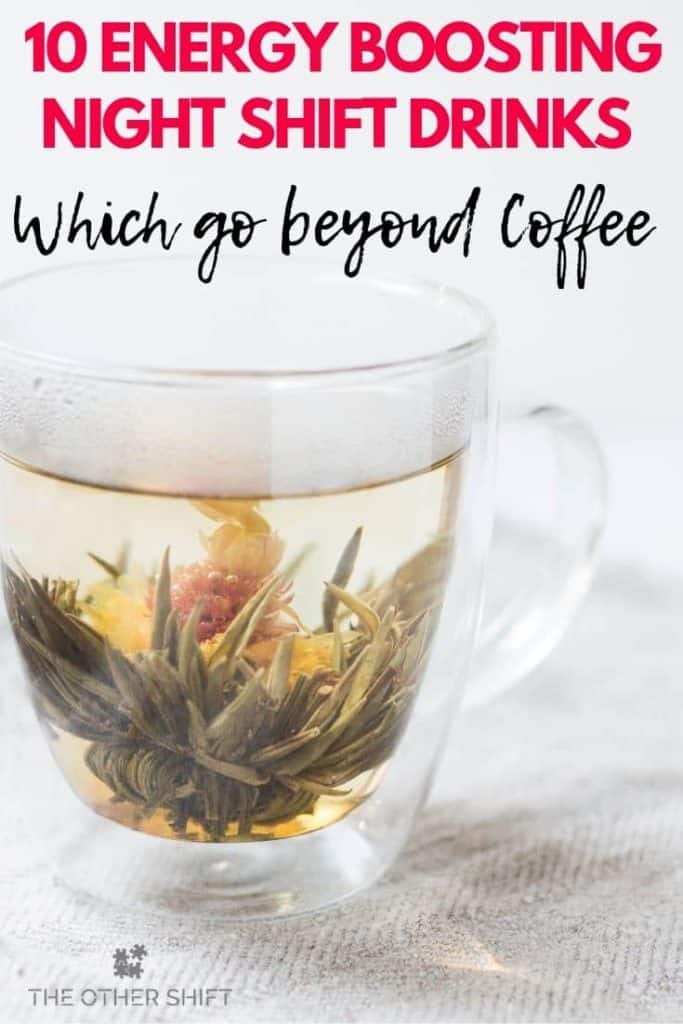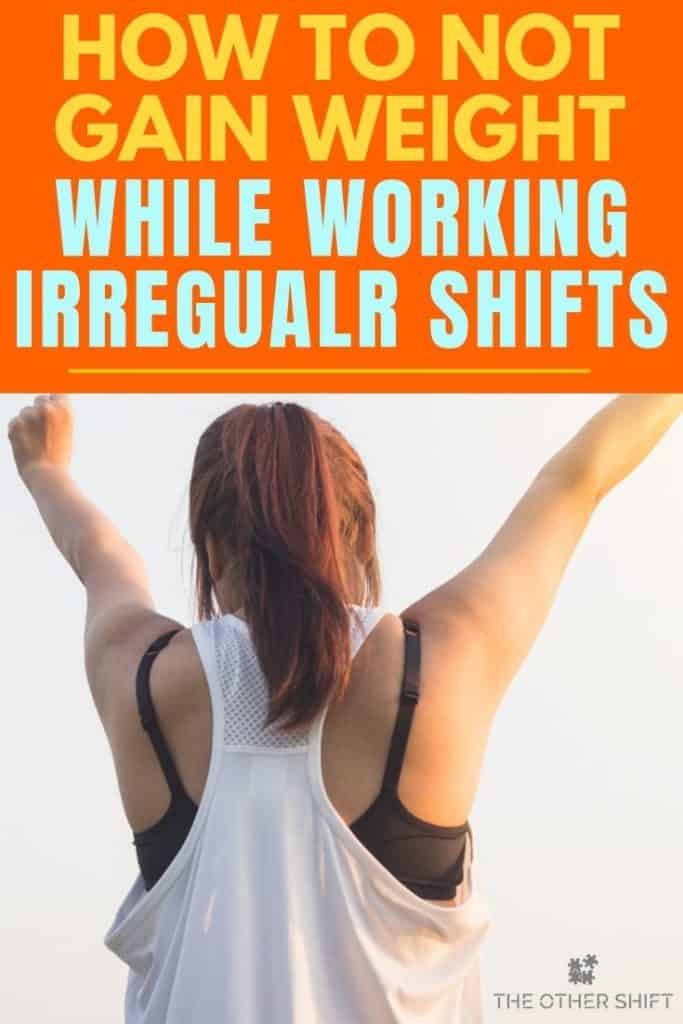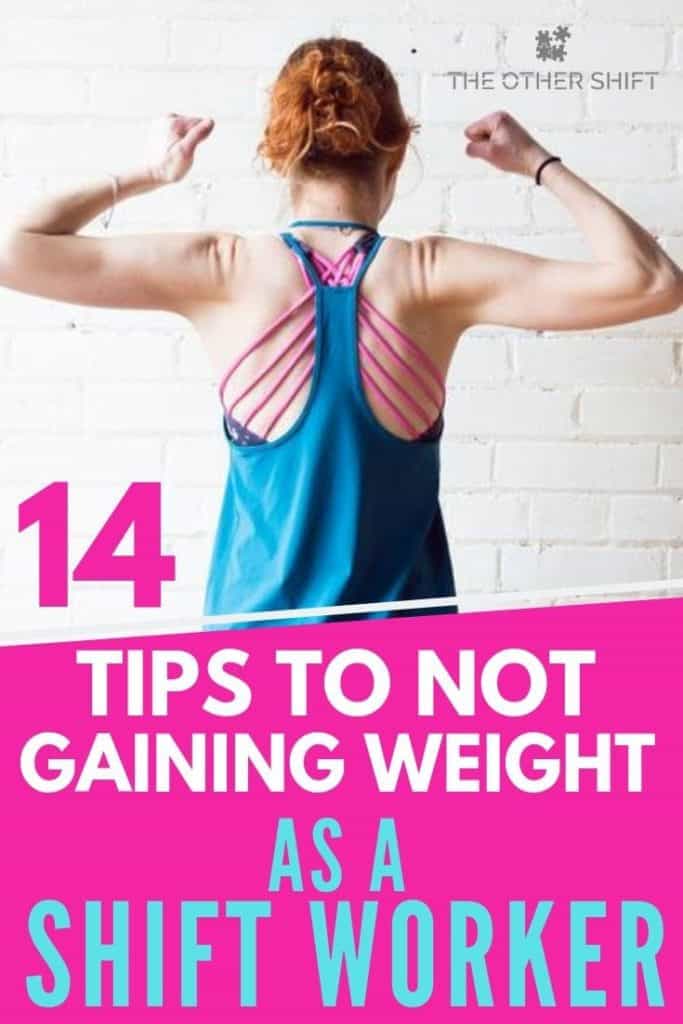Disclosure: This page may contain affiliate links, meaning we receive a commission if you decide to make a purchase through our links, but this is at no additional cost to you. Please read our disclosure and privacy statement for more info.
I never really understood why shift work was linked to weight gain any more than a typical 9-5 job. Surely, by simply working an irregular schedule, our waistlines can’t be impacted that greatly? I got to work and did a bunch of research to figure out if shift work really can make you gain weight and what we can do about it.
Night shift workers are at a higher risk of sleep deprivation which can lead to poor food choices and result in limited motivation to cook healthy, nutritious meals. Appetite hormones are also affected which can cause overeating and consequently weight gain.
This post is not your average “weight loss for shift workers” post. We have already written about that in the posts below, so take a look at these if you do want to successfully lose a few unwanted pounds.
- Weight loss tips when working 12-hour shifts: How Can I Lose Weight Working 12-Hour Night Shifts?
- Keto diet for shift workers: Graveyard Weight Loss: Shift Workers Guide to the Keto Diet
- Intermittent Fasting: Should I Eat on Night Shift? Why Intermittent Fasting Works
- Best weight loss foods: 15 Best Foods for Weight Loss on Night Shift
This post is primarily aimed at those who simply don’t want to gain weight through shift work and maintain a healthy figure without doing anything crazy.
It details 14 insider tips you can use to strategically enjoy the guilty pleasures in life without needing to add an extra hole in your work belt. Let’s jump in.
Does Shift Work Make You Gain Weight?
Quick answer – Yeah, it can.
But why does it impact us more than the 9-5 cousins?
Shift workers, particularly those who work nights and struggle to sleep during the day, who receive less than 7 hours sleep a night, are at a higher risk of weight gain due to sleep deprivation.
But what happens when we are deprived of sleep?
Here are four main points I’ve summarised which I think best explain what’s happening:
1. We Crave Unhealthy Foods All The Time.
When we are tired, we crave unhealthy, high sugar and high carb foods which can give us the energy hit we desperately want. At the time, most of us know the hit is short-lived but we often don’t care because we are so tired and just need a quick fix.
Though it might be harmless to eat this way, after an hour or so you’ll start to feel tired again, craving more sugar, leading to overeating. Doing this consistently, shift after shift, can lead to weight gain.
2. Our Hormones Are Confused.
When we haven’t had enough sleep, our hormones send confusing messages making us feel hungry when we are actually not.
We have two “appetite” hormones called leptin and ghrelin. Leptin sends messages to the brain telling it “I’m full” while ghrelin sends the “I’m hungry” message. I remember the two by ghrelin is “growling” at me to eat…
When we are tired, the body increases the “I’m hungry” ghrelin hormone while decreasing the level of leptin.
Cut a long story short…
We are convinced to keep snacking even when we might not be hungry at all, leading to overeating and heightening the risk of obesity.
3. We Lack Motivation
We are less motivated to exercise if we are exhausted and even when we do, the workout is less effective.
Yeah. Even if you make the effort to go to the gym and workout for 4-5 hours, the workout will be nowhere near as good vs. having 7-9 hours sleep. (source)
4. Our Digestion Works Differently Overnight
While the sun is down, such as during a night shift, our digestive system slows down and changes the way it works, going into “hibernation mode” (at times).

One of the big changes that occur during this time is our body produces LESS insulin to break down the food we eat, thus impacting our metabolism. This can be a big issue if we keep eating big, carb-rich foods overnight as there are fewer hormones and chemicals present to break down this food into energy we can actually use.
So based on all that, I think to successfully maintain a healthy weight and avoid putting on the unwanted pounds whilst being a shift worker, you need to focus on four main key areas:
- Prioritizing sleep for 7-9 hours every single day even when working night shift or the often challenging rotating shift schedule. (Read our helpful complete guide to rotating shift work here).
- Thinking not only about what you eat but when you eat
- Is the simple equation of calories in vs calories burnt, canceling each other out?
- Having a strong sense of self-belief, determination and setting a high standard for yourself – even when you’re tired.
Taking into account these four points and what is actually happening in the body when we haven’t had enough sleep, let’s dive into the tips stopping you from gaining weight as a shift worker.
1. Stop Delaying Bedtime on Night Shift
How much sleep are you honestly getting every day/night depending on your shift? 4,5,6 hours at the most? I hate to be the sleep police but it’s just not enough.
BUT before you yell at me for being inconsiderate, I know it’s easier said than done to just get more sleep as a shift worker. As an ER nurse myself I know how hard it can be to switch off and simply float into la-la land.
Kids, long hours, your ability to wind down quickly and also your love for Netflix and playing games are a few of the other roadblocks you’ve probably faced.
So moving forward, whatever shift you’re on, work out when an appropriate bedtime is for you in order to get 7-9 hours of sleep. Don’t assume you know the time and actually count back to see when you really need to be asleep. Be strict with yourself about this bedtime if you want to take your personal weight goals seriously.
Here are some things you’re probably doing before bed which keep you awake. These are the areas we suggest you attack head on first and foremost:
- Watching TV or a movie in bed.
Resist this. Let your mind and body make the connection between your bedroom and sleep – not your home cinema. Also, don’t be tempted to put on a full-length feature film like Titanic 30 minutes before your bedtime. Despite being an epically great film, we all know how it ends and sleep is more important.
- Doing your jobs.
Don’t run errands, meal prep, talk to the neighbor or call a chatty friend on the phone just for a yarn. As overwhelming as this may be, attend to these things once you get up. Of course, if something is urgent like taking the kids to school, then you are left with no choice. The things we think are super important can sometimes wait 8 hours. If you work nights, your aim should be to be in bed within 30 minutes – 1 hour of getting home.
Read, Working 2nd Shift With A Family: How To Remain A Solid Unit to learn more useful tricks.
- Becoming stressed at the thought of sleeping in one big chunk.
If this sounds like you, stop getting anxious. If you need to break up sleep into a few, then go for it. A podcast I love will back me up here too. As long as you can fall back to sleep easily later on. And you’re still able to get 7-9 hours sleep in a 24 hour period. (source)
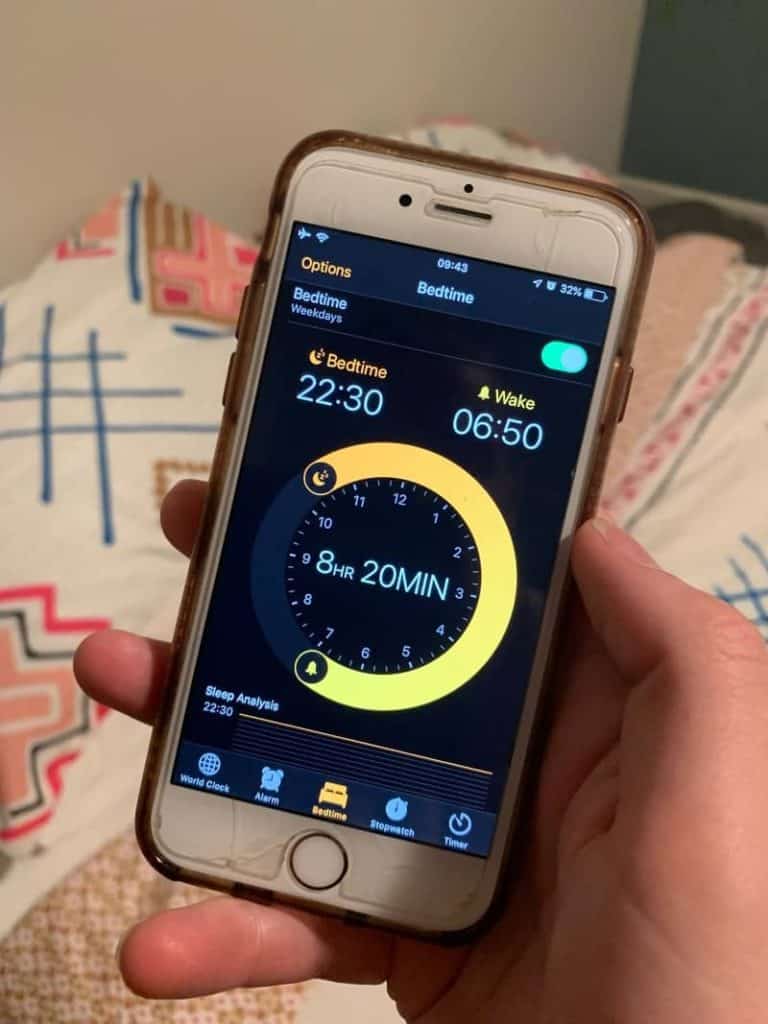
Need a reminder/alarm to go to sleep?
Use the “bedtime” feature if you have an iPhone (within the clock settings), to remind you when bedtime is. The alarm is annoying when you’re in the middle of something but I think it works a treat. Similar settings I’m sure can be found on Android devices or through an app which can make a huge difference when creating new habits.
I used to think that sleeping was “wasting time” as I could be working, cleaning and being productive, but it couldn’t be further from the truth.
Your body and mind NEED time to relax, recoup and process all the stuff you did during the day. There is a reason why mother nature designed humans to sleep for a 1/3 of the day… so we can’t keep ignoring it and pretend we can function on less sleep if we really want to keep control of our weight.
If you are having trouble sleeping once you do finally jump into bed, we created a specific post you’re going to love titled, Can’t Sleep After Night Shift? 13 Weird Tips That Actually Work. This was a really fun post to write and I learned a bunch of new techniques I use and love when sleeping seems impossible.

2. Block Out The Blue Light
While on the topic of sleep, have you heard about blue light?
It’s the light coming from the sun during the day and also the artificial light from your phone, TV, bedside lamp and also the fridge.
This light is great during the day, when on day shift, afternoon/2nd shift and even on a day off, to reset our body clock. But before bed, it’s no good.
Our sleep hormone melatonin LOVES darkness in order to work properly. So blocking out any form of light 90 minutes – 2 hours before we sleep is ideal.
But I don’t expect you to walk around your house while it’s pitch black, as you’ll end up black and blue from walking into furniture, walls and kids toys.
Instead, here are a few things you can do to block out the blue light and stay best of friends with your sleep hormones.
- Wear blue light blocking glasses at least 90 minutes before you intend on sleeping.
But we think the longer you wear them for the better. These glasses allow you to STILL use your phone and watch TV, without the light upsetting your sleep hormones.
We wear a brand called Swanwick Sleep after trialing a whole bunch and we are continually impressed. This is what they look like. Slick right?
after trialing a whole bunch and we are continually impressed. This is what they look like. Slick right?


- Dan and I wear them every single day and night in the window before bed, regardless of the shift we are on. We recommend them to you without a speck of hesitation because we have seen results first hand. Check out our recommended shift work tools page here and explore our buyers guide to these glasses and why you need a pair.
- Charge your phone OUTSIDE the bedroom.
I know this may seem foreign, almost like I’ve cut off your right arm, but the lack of distraction and blue light will work wonders for your sleep hormones and even better for your relationship. If you need to carry a pager for work, this bad boy can also remain outside the bedroom too. If you are on-call or need your phone for extreme personal reasons, these are two exceptions to needing a phone by your bedside. Otherwise, get it out of there.
But what about an alarm to get my butt out of bed?
We created a list of the best alarm clocks for shift workers, but particularly for those who work nights. These come with some funky settings to help you even fall asleep quick smart. Check out the post here – 7 Best Alarm Clocks For Night Shift Workers.
- Use blackout blinds
Before you leave for a night shift in particular, close the curtains. This makes sure your bedroom is primed and ready once you get home. Here are our recommended blackout blinds via our shift work tools page. The two options we give are very reasonably priced and easy to install for an almost 100% black-out experience.
There is no need to put up with the light in your bedroom anymore – particularly if it can lead to weight gain!
- Wear an eye mask which is comfortable and doesn’t fall off
In order to block out the remaining light, wear an eye mask. There is a heap to choose from which we compared in this article, Top Selling Eye Masks for Sleeping For Total Block-Out. But here are the top eye masks we recommend (pictured below) and why.
- Sleep in the basement or a room with fewer windows.
This is also great to limit the noise of dogs barking and street traffic. If living in an apartment block, ask for the apartment on the top floor. There is then no need to be distracted by footsteps above you.
Don’t forget about minimizing the noise for the sake of your waistline.
Consider using white noise machines, earplugs (here are our favorite), carpeting your bedrooms and also listening to sleep meditative music such as these beauties!
The bottom line here is to take the time to block out the blue light in order to get great sleep AND protect your eyes because as we know, not getting enough sleep can lead to a pretty dire situation causing more than just weight gain.
Interested in what else being sleep deprived can do for us? Read Is Night Shift Bad For You? 11 Truths Uncovered.
3. Let the Light In After Waking from Night Shift
While blocking out the light before you sleep is important, it’s equally vital to push open the blinds and let the sunlight in just after waking.
The sunlight (vitamin D) is not only great for bone development, disease prevention and cell growth but it’s also effective for keeping our waistlines at bay. (source)
How?
Remember the appetite hormones leptin we spoke about earlier? It’s the one which tells the brain we are full.
Studies show that leptin levels were higher in sleep-deprived adults who were exposed to bright blue light in comparison to only dim-light (source). We want more of this hormone, telling our brains and bellies we are full to prevent snacking and overeating.
So bring on the light anytime – except in the 2 hours before bed.
Personally, I also think when the sun is shining it boosts my desire to exercise outside and puts me in a darn good mood. Another reason to get out in the sun!
If you want a double boost of vitamin D, try eating foods which are rich in the stuff like:
- Salmon – A 3.5-ounce serving makes up 90% of your recommended daily value (400 IU)!
- Tuna
- Cereal
- Eggs Yolks
- Cheese
- Soy milk
What about a vitamin D supplement? Do I need one? Will they help me not gain weight?
If you are spending enough time outside in the sunshine, you probably won’t need to take a supplement. But if you’re struggling to meet the requirements due to your shift work roster, taking a supplement is safe and even effective in helping boost your vitamin D levels (source) Look for a vitamin D supplement that contains vitamin D3, also known as cholecalciferol. Remember to always seek advice from your doctor if you’re starting a new supplement.
Related Posts:
- Adjust to night shift: How Long Does It Take to Adjust to Night Shift?
- Not getting sick: How to Work Night Shift, Stay Healthy and Not Get Sick
- No Sleep: 8 Useful Hacks For Surviving Night Shift With No Sleep
When waking from the night shift, this is also the perfect time to weigh yourself. Find out more about the timing of this mundane but important task here in a post we recently put together.
4. Turn Down the Thermostat
Again, another tip in the sleeping department to prevent weight gain…
Did you know our body naturally cools when you sleep? That’s why we feel the 4am chill on night shift…
Don’t make its job any harder than it needs to be by making your bedroom all warm and cuddly once you get home.
Keep the temperature in your bedroom 65 to 70 degrees Farenheight and resist wearing heavy PJ’s often causing you to wake due to overheating. Don’t forget to also use a fan or the air-con.
To give the body and brain one final boost in the temperature department to help you sleep, why not take a warm bath or shower just before bed?
By increasing your body temperature in the shower/bath then suddenly dropping it once you get out, it can signal to your brain it’s time for bed.
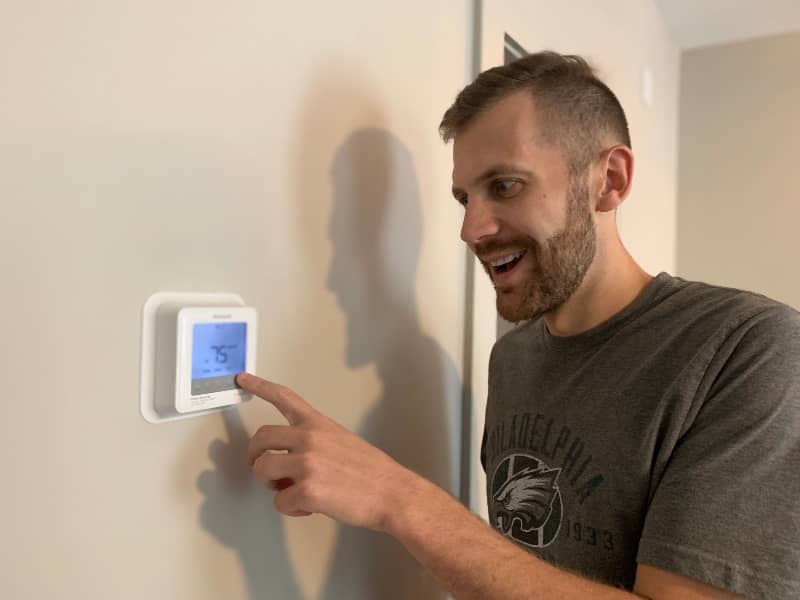
What about Aromatherapy? Can that help with sleep too?
The jury is still out wether smelling essential oils can suppress our appetite and make us eat less. (source) But what is known is lavender, vanilla, green apple and cucumber promote relaxation which can help you get better sleep, effective in preventing weight gain. Hereis our favorite lavender oil on Amazon.
5. Eat Fewer Calories If…
You’re not burning them off.
I mentioned in the into, this post is not a weight loss article but more so a healthy guide to not gaining weight. Not every shift worker wants to lose weight and is happy where they are, despite what the media portray.
But in order to maintain a healthy weight consistently and stick within a happy range, we do still need to be aware of what we are using to fuel our bodies at every time of day. Yeah, unfortunately, what you eat on night shift counts too…
You may have heard that what we eat accounts for about 80% and exercise counts for the other 20%. So it doesn’t matter if you exercise for 3 hours at the gym, burning off hundreds of calories, if you are eating total garbage every other moment.
Yes, these exercise fanatics can probably eat a higher volume of food and more snacks because they are burning it off, but it must be in moderation otherwise the scales tip and you’ll most likely get sick in the long run.
But what does this mean for us working shift work?
Simply. The number of calories we eat and drink needs to be on par with what we are burning off in exercise and movement. You don’t have to diet to avoid putting on weight while working shift work but you need to be aware.
But How Many Calories Are We Allowed Every Day?
- Women need to eat around 1500 calories to lose weight and 2000 to maintain their weight
- Men, on the other hand, need to eat around 2000 to lose weight and 2500 to maintain a healthy weight.
So, if you simply want to stay the same weight eat either 2000 calories if you’re a lady, or 2500 if you’re a bloke.
If you want to keep track of your calories digitally instead of having to write it down constantly, this is a hugely popular watch and fitness tracker worth exploring on Amazon.
The funny part about this whole calorie thing is you could eat a Big Mac, medium fries and drink for a whopping 1100 calories and still lose weight… if you don’t eat anything else and don’t exercise.
This is of course NOT something we recommend at all, so don’t try it. You’ll get sick, run down and it just won’t be very fun for you.
Instead, we recommend a few other things:
- Be aware of the high-calorie items.
For the last 10 years of working shift work, my weight has stayed pretty much the same and I NEVER counted calories. But I was aware of the foods (like honeybuns!) which sucked my calorie count due to the carbs and sugar and made sure I ate these in moderation.
- Eat sweets sparingly
I’m not great at totally ruling out the sweet stuff because well, I love sweet stuff. But I am aware now, after giving calorie counting a whirl, what to be wary of. Before you dive into the packet of chips, chocolate or your favorite donut, see how many calories you have left for the day to not put on weight. If you still have “calories left”, even after a rough estimate, then go for it.
- Exercise to eat.
Dan and I always joke that we exercise to eat. While we try not to be pigs and overeat, we do make an effort to exercise every day to maintain balance when we do overindulge ourselves. The fact of the matter is, in order to keep the scales level we need to either eat less or exercise more in order to burn the calories we ate the previous day.
- Filling at least half of your plate or container of food with veggies.
I’m sure this is no surprise, but the calories in most veggies are super low but fill you up nicely. When making a meal make sure at least half the plate is full of these colorful veggies and the other two parts with protein and whole grains. Don’t complicate this process.
- Use a smaller plate.
Physically using a smaller plate or container ensures you are not overeating, unless you go back for seconds and thirds! If you need new containers, get these. They don’t warp in the microwave, stain after eating spaghetti and smell after repeated use.
- Use the slow cooker.
Is there a more shift work friendly appliance? Creating multiple, healthy meals allows you constant access to filling food without needing to rely on the vending machine. Here are our favorite slow cooker and pressure cookers via our shift work tools page.

I created a general table of the foods which are filling but low in carbs, which I recommended adding into your diet to prevent snacking, particularly when tired.
| Food | Calories (* approximate) |
| Oats | 166 calories in half a cup (uncooked) |
| Greek yogurt | 35 calories in a 2 Tbsps |
| Berries | 85 calories in one cup of blueberries |
| Eggs | 72 calories in x1 large, raw egg |
| Plain popcorn | 106 calories in 28g |
| Lean meat (chicken, turkey and low-fat cuts of red meat) | 165 calories, for a 3.5-ounce (100-gram) serving of chicken breast |
| Soups | 71 calories in a cup of pumpkin soup without cream |
| Frozen mixed veggies | 108 Calories in 1 cup of Birds Eye Classic Mixed Frozen Vegetables |
| Avocado | 130 calories for 1/2 an avocado |
| Almonds | 97 calories in 14 raw almonds |
This is not a diet.
This is just a way of living where you have a nice balance between the good, the bad stuff and what get’s burnt off through exercise. Just ruling out everything “bad” with a big black sharpie is not what we are about as everyone has an off day, but you have to manage these guilty pleasures.

6. Don’t Eat When Your Body Is Not Ready to Process the Food
I was shocked to learn recently that I have been eating at the wrong times for my entire nursing career!
I thought it was fine to eat a big “lunch” or “second dinner” between 1-5am when working as that’s what I had always been told and witnessed in various tea rooms.
But it seems that advice was actually wrong. Smaller snacks more often is the key. Not big, gigantic meals overnight…
Why? I mentioned in the intro that our digestive system and metabolism slows down during the night or during the time we are programmed to be sleeping.
If we eat big, carb-heavy meals during this time our digestive system cannot cope and we often feel bloated, nauseous, suffer from stomach pain and experience bowel issues during and after the 3rd shift.
Other shift workers also complain of gastric ulcers, peptic ulcers and gastritis when things get bad.
Here are a few times of the day shift workers really need to be aware of in order to stay friends with our digestion system.
I have also given you a few food and drink options you can enjoy during this time to avoid feeling horrible and sluggish after eating.
| Time of day | What to eat and drink |
| Before an early shift starting between 3-7am | – Drink a big glass of water (with or without lemon to help boost digestion) and refrain from drinking your morning coffee until the sun is rising. – A small handful of nuts or a few mouthfuls of yogurt will keep you full until breakfast at 6.30-7am. |
| After a 2nd/late shift finishing at 10pm | – x1 whole grain piece of toast with banana and honey or with turkey meat (or why not try gluten-free bread as it can be easier to digest?) – Chamomile tea – Warmed milk – Almonds |
| After a swing shift finishing at 1am | Similar meals as above. Consider bringing almonds in the car with you to lessen the temptation to stop for take-out. |
| During a night shift between 1 and 6am | – Raw veggie sticks with hummus or homemade guacamole – String cheese -Homemade soups – Veggie Frittata See: When Should I Eat On Night Shift? |
The Bottom Line Here…
Is to resist eating large, carb-heavy type meals when our body is not ready for it.
Use the sun as a guide. If it’s still dark outside, such as on night shift or before an early shift, our digestive system is not ready for a big meal. During this time it’s best to stay hydrated and eat small filling snacks (such as in the related posts below) and then wait till the sun is up before enjoying a larger meal.
Related posts:
- Meal prep: 12 Valuable Meal Prep Tips for Busy Shift Workers
- Meal Ideas: 6 Healthy, Freezable Shift Work Meal Ideas For Beginners
7. Skip the coffee and beer 5-6 hours before bed
Coffee is a wonderful stimulant and an incredible source of antioxidants used by almost 100% of shift workers around the world – except myself and Dan.
And while caffeine works brilliantly to keep us alert and focused, most find it impacts negatively on their sleep and we know the issue with that.
A good rule of thumb is to avoid drinking coffee or any type of caffeine such as soda, energy drinks and even chocolate 5-6 hours before you jump into bed.
Caffeine can stay in our system for up to 12 hours making sleep almost impossible for some – and weight gain therefore inevitable.
As for alcohol, it can wreak havoc with the stage of sleep responsible for processing information- rapid eye movement (REM).
Plus, it can make us want to wee ALL THE TIME! Skip the morning beers after a night shift and consider the shift you’ve got the next day if thinking of having a few drinks with dinner while on day shift.
If you’re wondering about the number of calories in alcohol, I put together a table comparing some popular drinks for you.
This gives us both an indication of what we’re in for if we happen to drink a few beers after a shift, plus have take out and ice cream on the way home while skipping the gym... (yeah, we’ve all been there!)
| Alcohol beverage | Calories | Size |
| A glass of white wine | 121 Calories | 5.2-oz serving |
| A glass of red wine | 126 Calories | 5.2-oz serving |
| Bourbon (Jim Bean 80 proof) | 100 Calories | Shot 1.5-oz serving |
| Budlight beer | 110 calories | 12-oz serving |
| Blue Moon Beer | 171 calories | 12-oz serving |
| Vodka Cranberry | 163 calories | 5-oz |
| Espresso martini | 302 calories | 1 cocktail |
Dan and I love “a cold one” as much as the next shift worker but it comes down to two things.
- Are you able to burn it off the next day and not let those calories be stored as fat leading to weight gain?
- Will drinking that alcoholic beverage prevent you from falling asleep, resulting in frequent sleep disturbance? Or cause you to feel really lousy the next day leading to poor “hungover” food choices?
Just think about this before reaching for the bottle opener…
Read more about the effects of drinking alcohol after a shift by clicking on the image below.
8. Small Meals Before Bed
A pizza for breakfast after a night shift or a big bowl of nachos after a 2nd shift or swing shift may seem like the perfect way to reward your efforts after a shift. But unfortunately, you will likely be left with more than a stomach ache and a bloated belly when your head hits the pillow.
Instead stick to smaller, but super filling meals like my two favorites:
- A bowl of warm oatmeal with banana, warmed frozen berries and no-fat yogurt
- A piece of wholegrain toast with sliced banana and honey (or avocado and vegemite
 – you know I’m Australian with this suggestion!)
– you know I’m Australian with this suggestion!)
If you want more breakfast ideas, you’ll find them through these two posts:
- What to eat after night shift: What Should I Eat After Working Night Shift?
- Breakfast ideas: 6 Quick and Healthy Night Shift Breakfast Meal Ideas
But what if I’m not hungry?
Try and force yourself to have a few mouthfuls of something. I have often skipped breakfast after nights or not eaten a snack after finishing the swing shift and woke up feeling hungry a few hours later. It’s hard to eat then go back to sleep immediately – plus it puts me in a bad mood…

9. Having a Bad Eating Day? Get a Jump Rope
We can all slip up from time to time and eat too much of the high-calorie stuff. But don’t beat yourself up about it by eating more and instead reach for the jump rope.
This simple childhood toy burns an INSANE amount of calories in a short amount of time because it’s a whole body work out.
Yes, it hurts. Yes, it’s hard and my goodness it makes you sweat. But it’s without a doubt one of the best forms of exercise I have found as a shift worker.
Here are some of the other reasons why we love to jump rope:
- Super cheap
- Mobile
- Doesn’t require much skill
- Easily use distraction techniques to get better and forget about how long you’ve been jumping for.
I created a quick table for you to compare jumping rope with common other activities you may do to keep fit. This gives you a good idea about how effective jump rope really is.
| Activity | Calories |
| Jump rope – 15 minutes | 200-300 calories (For those who love Starbucks, that’s about 3/4 of a blueberry muffin!) |
| Jump rope – 30 minutes | 600-800 calories |
| Running on the treadmill at 5mph (125pound person) for 30 minutes | 240 calories |
| Running on the treadmill at 5mph (185-pound person) for 30 minutes | 355 calories |
| Swimming breaststroke for 30 minutes | 150 to 280 calories |
| Walking for 30 minutes | 90 to 200 calories (100 calories per mile are burned for an 180-pound person) |
Source (5), (6), (7) * These numbers are all approximate and vary based on intensity, weight of the rope and the persons body weight among a range of other factors.
Bottom line: By jumping rope for 15-30 minutes per day and combining this with bringing your own healthy meals to work, you could see less wobbly bits and even feel stronger. Remember, if you want to eat more and still stay the same weight…you need to burn it off and jump rope is a great way to do this.
Here are our favorite ropes and sports bra for the ladies!
But lately, we have also been loving this Weighted Jump Rope from Amazon.
from Amazon.
I like that this rope is more “rope-like” and doesn’t whip my legs as much if I stuff up. Plus, it’s well made and affordable for a weighted rope. I like to alternate between this rope and say a non-weighted rope like this one (also available via Amazon.com) to make the workout a bit more challenging, particularly if I am short on time.
(also available via Amazon.com) to make the workout a bit more challenging, particularly if I am short on time.
10. Can’t Jump Rope? Pre-Pay for Exercise
I get that not everyone can jump rope for health reasons, so I wanted to give you another effective tip for burning off those extra calories and that’s pre-paying for exercise.
Simply using motivation as your key driver to exercise is often, well for me anyway, not enough. I need a bigger kick up the butt to get moving, particularly after a 1st shift followed by a 2nd shift or during a run of nights.
One way to do this is to pre-pay for some kind of exercise class, membership or fitness app because nobody wants to waste money right?
If you and a friend or “work out buddy” pre-pay for something together the motivation to change into your activewear and leave the house is far greater. So I suggest finding a friend, maybe somebody at work or even a family member with similar goals and roster and workout together.
To get moving regularly, I personally use an app called 28 by Sam Wood. While it’s more expensive than a 24-hour gym membership I get A LOT more out if it.
The daily videos with commentary make sure my technique is on point and the meal plans are easy enough anybody can do them. And that’s coming from somebody not great in the kitchen.
If your interested to learn more, check out our link here and receive a discount off your first month’s membership. Here is an example of one of the videos in the program.
11. Drink a Different Kind of Fizzy Drink To Avoiding Getting Fat on Night Shift
If you’re a shift worker, there is a high chance you are holding an energy drink right now. Am I correct? Take a look at the sugar content on the back.
Anything less than 6g of sugar is okay but I’m guessing what you’re drinking is a little more than that…
While energy drinks and soda can give us an energy boost, particularly when we are feeling tired, there are three major flaws in using this strategy when trying to maintain a healthy weight.
- The sugar is often WAY too high, being stored as fat, if we don’t exercise consistently
- The amount of caffeine can be detrimental to our sleep if drunk too close before bedtime
- Energy drinks have been linked to causing heart pumping issues (source)
So what can you drink instead? Lots of delicious things!
- Kombucha – Also fizzy making it feel like you’re drinking soda but it’s actually great for your gut health
- Coconut water – often labeled as “natures sports drink” because of how refreshing it is
- Green Juice – We use and recommend Organifi Green Juice. Check it out here
 via Amazon.
via Amazon. - Water with fruit (check out our favorite drink bottle here to infuse the fruit without the pips)
- Homemade green smoothies
- Plain old water to stop headaches, constipation and making the body work harder then it needs to.
Check out a recent post we wrote about the energy-boosting drinks you can consume during your next shift by clicking on the image below.
12. Eat Watermelon!
Random. What’s so good about watermelon to help us prevent weight gain? It’s FULL of water!
The more hydrated you are the better your metabolism will work. This is the key to breaking down calories and fat into energy your body can use as your digestive organs are not needing to work harder for the same outcome.
If our digestive system is sluggish due to dehydration, our foods can be easily stored as fats leading to unwanted weight gain.
But as shift workers, we often get caught out thinking we only lose water when we visit the bathroom to pee. Where water can, in fact, be lost through lots of other ways like sweat, breathing, coughing, talking, pooping and crying. We can also lose even more water when we are unwell through diarrhea and vomiting.
The trick is to not focus on how many times you’ve been to the bathroom when determining how much water you should drink. Instead, aim for 2 liters every day, which equates to about 8-ounce glasses or half a gallon. (source)
Just a quick note…these numbers are a good rule of thumb for most people but can vary depending on the particular diet you’re on, the health of your heart and lots of other factors. If you are not sure, ask your doctor.
If you struggle to drink this much water, here are a few other ways to boost your water intake through food with a high water percentage such as:
| Cucumber | Watermelon |
| Tomatoes | Soups |
| Skim milk | Strawberries |
| Cantaloupe | Lettuce |
| Peaches | Oranges |
13. Maintain Rituals and Do the Things You Love
How does this lead to preventing weight gain? Well, do you emotionally eat when something is not quite going right or you feel sad about something like missing your dog and your kids?
I know people joke about this stuff, comparing themselves to Bridget Jones’ Diary, but the struggle is real for us when our roster is not playing ball.
But don’t give yourself an excuse to overeat or not exercise because you’re feeling sad. Nip that in the butt by continuing to make time for the things you love most. Date nights, working in the garden, spending time with your kids and playing with your dog is still possible if we are smart about it.
We recently wrote a post titled, 13 Advantages of Shift Work for Employees and Working 2nd Shift With A Family: How To Remain A Solid Unit which I think are valuable right about now
14. Set High Standards for Yourself
To maintain a healthy weight while working shift you need to set high standards for yourself. Expect more from yourself and don’t tolerate your own hand reaching in for a few more chips when you know you have far exceeded your calories for the day – even without counting.
You are better than this.
If you told yourself you’re going to start exercising every day, even in small lots, you have to do it. Even if you have pre-paid for a class or have a friend asking if you want to come for a run, in the end, it’s up to you to make it happen.
The other advice (actually this one is form Dan) is to visualize success.
Stop thinking about yourself as a “big person” or “big boned” who will always struggle with weight. If you’ve already made your mind up about yourself you will never move past this point in the long term. Positive thoughts!
You can stay healthy and maintain weight if you first believe in yourself and think positively about the direction you want to go.
Keep Reading…
- Burnout: Shift Work Burnout: Causes, Red Flags And How To Beat It
- Stop weight gain: How to Stop Holiday Weight Gain from Snowballing
- Prepare for night shift: How To Best Prepare for the Night Shift and Stay Healthy
- Days off: Help! Should I Stick to a Night Shift Schedule on Days Off?
- Staying fit: How To Stay Fit While Working Nights: 12 Sneaky Tips“
The key to staying a healthy weight and preventing the numbers on the scales climbing is all about three things; moderation, timing and sleep.
You can still have a piece of candy, donut and the extra coffee but you need to ask yourself…
- What time is it and can my body actually process this meal?
- Have I eaten too much “bad,” high-calorie foods today and there is no chance I will burn that off any time soon?
- Am I getting 7-9 hours sleep every day/night? Is this food or drink item going to impact the quality and amount of sleep I get, if I eat it?
I wish you all the very best in your shift work journey to a maintaining a healthy you.
Next up, Tackling Obesity: A Guide for Night Shift Workers.
Cheers,

Disclosure: This page may contain affiliate links, meaning we receive a commission if you decide to make a purchase through our links, but this is at no additional cost to you. Please read our disclosure and privacy statement for more info.
Recent Posts
An examination of the night shift professions, that while sometimes underappreciated, are necessary for civilization, in its current form, to exist. A city can be thought of as a machine. Each...
Culminated from an exhaustive yet well-funded journey into the night, this article will prepare you for life outside of work while being a denizen of the dark. During days off, night shift...



